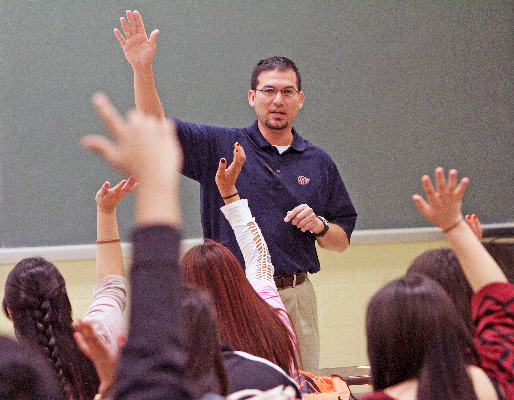Originally published March 6, 2015
By Daniel Perez
UTEP News Service
Anyone who looks into the eyes and listens to the voice of Canutillo High School Senior Blanca Reyes knows that she understands what hard work is; she comes from a family of migrant farmworkers.
Reyes was among 21 students from Canutillo who attended the first Migrant Student Symposium Feb. 27, 2015, at The University of Texas at El Paso. The afternoon event’s goals were to encourage the seniors and juniors to envision a successful journey through higher education and to familiarize them with the campus offices that could turn their dreams into reality.

Reyes said she has lived in farming communities in the region from San Elizario, Texas, to Berino, New Mexico, and has had to occasionally miss school to help her parents pick crops to help the family make ends meet. According to 2012 figures from the National Center for Farmworker Health Inc., only 28 percent of farmworkers complete high school and only 9 percent earn college credit.
Reyes’ eyes get misty and her voice cracks as she talks about the personal, academic and economic hardships of being a migrant farmworker, but the A-B student and her family understand that education is her ticket to a different life. Her parents encouraged her to do well in school and told her to learn all she could at the day’s symposium.
“School gives me hope,” Reyes said during a break. She shared her plans to enroll at UTEP and become a forensic science technician. “What I’ve done will not define my future. I hope to finish my education and be someone. I’m not going to give up.”
The symposium started with an informal lunch in Union Building East so the high school students could soak up the atmosphere of a college campus before moving to the Education Building for presentations about scholarships and financial aid. They also heard anecdotes from about 30 UTEP teacher education students that involved adversity, achievement and how they can envision their success.
The event was organized by Reynaldo “Rey” Reyes, Ph.D., associate professor of teacher education, whose personal roots are among migrant farmworkers. He was inspired by his mother, Angie Guerrero, who was a field hand in Texas and Colorado to help her migrant farmworker family. Her stories compelled him to assist today’s high school students.
Children from migrant families are historically among the most vulnerable student population because of their poverty, interrupted schooling, transitory existence and parents who lack formal education. The 2011 United States Farmworker Fact Sheet stated that by the time farmworker children turn 12, they put in 16-18 hours in the fields per week and average three different schools per year. The professor, who said recent research shows that approximately 50 percent of migrant high school students drop out, saw this event as a chance to give the Canutillo students a new beginning.
“We’re doing it to encourage these students from migrant backgrounds to attend college,” said Rey Reyes, who teaches bilingual and multicultural education. “We’re giving them the chance to be on a college campus and to interact with college students. I want them to put themselves in a position to see that they can succeed.”
Guillermina “Gina” Nuñez-Mchiri, Ph.D., associate professor of anthropology, drove home the point with an energetic bilingual keynote address where she shared her inspirational journey from growing up as the daughter of California migrant farmworkers to becoming an impactful, globe-trotting university professor.
She told stories of being hot, sweaty and smelling like onions as a laborer in the rain and mud, but added that the experience of picking different fruits and vegetables taught her about hard work and sacrifice.
Although a self-assured youth, Nuñez-Mchiri admitted to being scared when she left her comfort zone for higher education, but her confidence carried her from class to class as a peer who deserved to be there.
She advised the Canutillo students to think critically, grow their lives wherever they find themselves, find mentors who will help them achieve, and share what they know with others. To those who are not encouraged at home, she suggested they find “significant others” to help them navigate the way to college.
“Education is the key,” Nuñez-Mchiri said. “There are no excuses.”
The symposium was a fresh way to get migrant students to see themselves as people who can succeed in higher education, said Maritza Garcia, Ph.D., director of the Canutillo Independent School District’s Academic Language Services Department. Garcia grew up among “the poorest of the poor” in Honduras, which helped her relate to migrant students.
She said events such as the UTEP symposium help her migrant students know they can overcome external forces such as living and working conditions that impact their ability to achieve academically.
“This event helps them to be knowledgeable of a college, exposes them to the kinds of resources available and the willingness of people to help with their education,” Garcia said. “We tell them how capable they are and our belief in their ability to succeed.”
Rey Reyes, the event organizer, said he wants the program to expand to eventually include all the region’s migrant students in high school and middle school.
The event sponsors were UTEP’s Office of the Vice President for Student Affairs, Office of the Dean of the College of Education, the Office of Scholarships, the Department of Athletics and the Department of Academic Technologies.